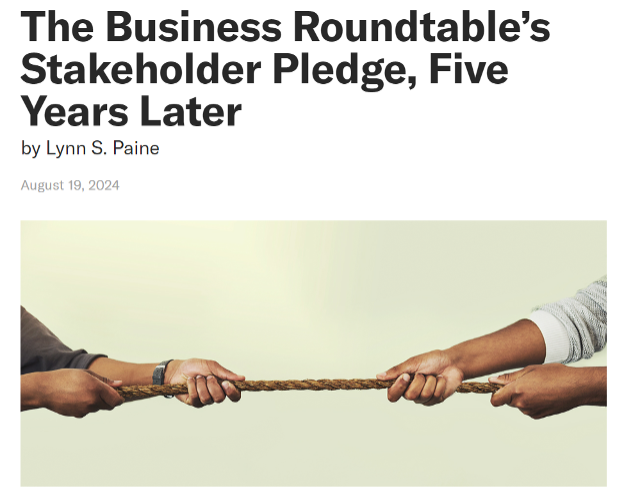Two HBR Features Examine Progress, Challenges of Stakeholder Capitalism
 The Harvard Business Review in its latest issue publishes two feature articles on stakeholder capitalism in conjunction with the fifth anniversary of the Business Roundtable pledge to address the needs of all stakeholders.
The Harvard Business Review in its latest issue publishes two feature articles on stakeholder capitalism in conjunction with the fifth anniversary of the Business Roundtable pledge to address the needs of all stakeholders.Lynn S. Paine—Business Roundtable Pledge 5 Years Later
Paul Polman, CEO Emeritus, Unilever, Sustainability Advisor
Click here for links to information about EEA engagement solution providers.
A Harvard Business School professor, a retired CEO and sustainability strategist agree that stakeholder capitalism is a concept whose time has come but one which continues to face many headwinds, including a clear definition or implementation framework.
Lynn S. Paine—Business Roundtable Pledge 5 Years Later
Lynn S. Paine, Baker Foundation Professor and the John G. McLean Professor of Business Administration, Emerita, at Harvard Business School concludes that while stakeholder capitalism makes business sense, it remains in its infancy. In the article, she writes: “Five years ago, the Business Roundtable issued a statement pledging to ‘lead their companies for the benefit of all stakeholders.’ In the past five years, stakeholderism has gained wider acceptance and helped many corporate leaders see the value of taking the interests of their stakeholders seriously when planning, developing strategy, making decisions, assessing risks, allocating resources, and so on. But that is a far cry from replacing shareholder capitalism as the central organizing principle for US companies. For that to happen, much more is required. Proponents will need to define more clearly what stakeholder capitalism is, strengthen its theoretical foundations, and develop a playbook for implementing it, including metrics for measuring performance and guidelines for making tradeoffs. They will also need to build an ecosystem of investors, executives, directors, advisors, and other professionals (lawyers, bankers, accountants, analysts, and so on) who understand and support it, embed its precepts in law and regulation, and educate future leaders in its tenets and practices.”
In the article, she writes: “Five years ago, the Business Roundtable issued a statement pledging to ‘lead their companies for the benefit of all stakeholders.’ In the past five years, stakeholderism has gained wider acceptance and helped many corporate leaders see the value of taking the interests of their stakeholders seriously when planning, developing strategy, making decisions, assessing risks, allocating resources, and so on. But that is a far cry from replacing shareholder capitalism as the central organizing principle for US companies. For that to happen, much more is required. Proponents will need to define more clearly what stakeholder capitalism is, strengthen its theoretical foundations, and develop a playbook for implementing it, including metrics for measuring performance and guidelines for making tradeoffs. They will also need to build an ecosystem of investors, executives, directors, advisors, and other professionals (lawyers, bankers, accountants, analysts, and so on) who understand and support it, embed its precepts in law and regulation, and educate future leaders in its tenets and practices.”Nonetheless, “Whether or not stakeholder capitalism replaces shareholder capitalism, stakeholder analysis and management will continue to be essential tools for boards and business leaders whatever their governing objective. And while this is hardly the complete transformation many supporters of the BRT declaration of 2019 hoped for, it does represent important progress.”
She points out that, “Five years later, the debate continues and the envisioned mass pivot to stakeholderism has not materialized. Granted, the term ‘stakeholder’ has become ubiquitous. It is rare to find a listed company that doesn’t claim to be committed in some general sense to all its stakeholders. It’s also true that some companies have taken steps to address stakeholder concerns, improved the flow of information about stakeholders to the boardroom, and introduced performance goals and (modest) incentives to advance certain interests of non-shareholder stakeholders. But we are no closer to a resolution of the debate, and shareholder primacy remains deeply embedded in our system of corporate governance.”
Other challenges: “One reason for stakeholder capitalism’s failure to take deeper root has been a lack of consensus about what it requires of companies and what companies owe their non-shareholder stakeholders. Another barrier to the widespread adoption of stakeholder capitalism has been the absence of a strong and empowered constituency to promote it.
On the other hand. “It turns out that a myopic focus on maximizing shareholder value can be self-defeating. Consider the drug-pricing excesses at Valeant Pharmaceuticals, the fake accounts scandal at Wells Fargo, or the airliner safety debacle at Boeing. Had these companies paid more attention to serving the interests of their non-shareholder stakeholders, they might well have avoided these calamities — and benefited their shareholders at the same time.”
In short, she writes, “more corporate leaders have recognized that stakeholder analysis, far from being a distraction or a waste of time, is a valuable tool for identifying risks and opportunities, and crafting strategies that align stakeholder interests with value creation for shareholders.”
That said, “The past five years have also taught that consistently improving the welfare of all stakeholders is far more challenging than initially thought. The happy alignment of stakeholders’ interests envisioned by stakeholder capitalism is easily upset by changes in a company’s circumstances or external environment, leaving corporate leaders to make difficult tradeoffs between the interests of different stakeholder groups. Several high-profile companies whose CEOs signed the BRT statement have found themselves in such situations. Consider AT&T’s 2021 decision to cut expected life insurance and death benefits for some 220,000 retired employees in order to, in the company’s words, ‘remain competitive and attract capital.’”
Paul Polman, CEO Emeritus, Unilever, and Andrew Winston, Sustainability Advisor
In their article, Stakeholder Capitalism Still Makes Business Sense, the authors contend that societal and climate challenges demand a more rapid shift to stakeholder capitalism that they agree was set back by the ESG backlash.
 Paul Polman was the CEO of Unilever from 2009 to 2019 and helped develop the UN Global Goals. He is a coauthor of Net Positive with Andrew Winston, one of the world’s active thinkers on sustainable business strategy. His other books include Green to Gold and The Big Pivot.
Paul Polman was the CEO of Unilever from 2009 to 2019 and helped develop the UN Global Goals. He is a coauthor of Net Positive with Andrew Winston, one of the world’s active thinkers on sustainable business strategy. His other books include Green to Gold and The Big Pivot.The CEOs who signed the Business Roundtable statement were right, the authors agree. “Serving only shareholders overlooks a fundamental reality: You must please customers, attract and retain talent, and work with communities and suppliers to create valuable enterprises. Long-term resilience and business survival depend on sustainably serving stakeholders and society. Business cannot thrive on a damaged planet with unhealthy people.”
Polman and Winston suggest that “While the self-selected BRT companies may have already leaned toward stakeholder thinking, their commitment mattered and drove progress. But more recently, especially in the US, enthusiasm for many stakeholders’ sustainability priorities — such as climate change or DEI (diversity, equity, and inclusion) — has seemingly stalled.”
On the positive side, they note that “Even with a reduced focus, sustainability is now firmly on the corporate agenda, and the work continues.” And, “the shifting economics in favor of sustainability make it difficult, and bad business, to go back.”
Among the bad news, they say, “On climate, companies are lagging behind the 2015 Paris agreement goals to hold global temperature rise to below 2°C (and preferably limit it to 1.5 °C)...Unfortunately, two trends that are a sign of progress — the increase in regulations on materiality and reporting and the rise of ESG investing in the finance world — have contributed to the recent pullback. The regulations have driven some companies back to a just comply with the law mindset (which slows their ambition). And while investors coming to the table was a good thing, it has amped up attention on their needs over those of other stakeholders.”
Noting another setback: “Then came the backlash and growth of the anti-ESG movement, a heady mix of competing pressures on companies to do more legitimate sustainability work and avoid using ESG to greenwash or abandon ESG because of its perceived liberal roots and supposed distraction from financial returns (this one coming mainly from the political right). In this new environment many companies seem to believe that they just need to meet reporting requirements and don’t have to pursue more aggressive sustainability goals anymore.”
They add, “Across sectors, corporate commitments have faltered, especially around DEI. Some former leaders, like Nike, have laid off sustainability people. A few companies, like Tractor Supply Company and John Deere, have even issued anti-sustainability statements — no more DEI, no more carbon goals they say.”
On the other hand, “Perhaps the recent pullback isn’t too surprising,” they note. “True stakeholder capitalism requires a deeper change in thinking, moving from seeing sustainability as something at odds with profits — the longest-standing myth — to a more nuanced view of creating value through values and sustainability.”
Instead, “Most companies seem to be fine keeping their heads low, and the desire to lead publicly has nearly disappeared in the US. This is a colossal mistake. To say that this is a bad time to slow down is a profound, historic understatement. The world’s biggest challenges — climate change, inequality, biodiversity destruction — are getting worse.”
The authors contend that “Given the stress on our largest natural and societal systems, we need accelerated action — deeper work to build better, more regenerative businesses. We need to build net positive companies, that is, businesses that take responsibility for their impacts on the world and improve the well-being of everyone they touch.”
They suggest that “When things go off track, it’s helpful to return to basics. Companies should review the broad business case for sustainable action. Building net positive businesses is the best path to long-term value, resilience, and relevance. At the macro level, as we face systems collapse, it’s the only path. The cost of doing nothing greatly outstrips the cost of doing something. Companies should bring back the voice of stakeholders — listen to employees, ESG investors, civil society, customers, consumers, and more — and truly assess the costs of staying silent in the face of attacks on human rights and freedom. There’s far too much focus on the risk of doing something instead of thinking about what it says to stakeholders if you do nothing.”
ESM Is Published by The EEA: Your Source for Effective Stakeholder Management, Engagement, and Reporting
Through education, media, business development, advisory services, and outreach, the Enterprise Engagement Alliance supports professionals, educators, organizations, asset managers, investors, and engagement solution providers seeking a competitive advantage by profiting from a strategic and systematic approach to stakeholder engagement across the enterprise. Click here for details on all EEA and ESM media services.
1. Professional Education on Stakeholder Management and Total Rewards
- Become part of the EEA as an individual, corporation, or solution provider to gain access to valuable learning, thought leadership, and marketing resources to master stakeholder management and reporting.
- The only education and certification program focusing on Stakeholder Engagement and Human Capital metrics and reporting, featuring nine members-only training videos that provide preparation for certification in Enterprise Engagement.
- EEA books: Paid EEA participants receive Enterprise Engagement for CEOs: The Little Blue Book for People-Centric Capitalists, a quick implementation guide for CEOs; Enterprise Engagement: The Roadmap 5th Edition implementation guide; a comprehensive textbook for practitioners, academics, and students, plus four books on theory and implementation from leaders in Stakeholder Management, Finance, Human Capital Management, and Culture.
2. Media
- ESM at EnterpriseEngagement.org, EEXAdvisors.com marketplace, ESM e–newsletters, and library.
- RRN at RewardsRecognitionNetwork.com; BrandMediaCoalition.com marketplace, RRN e-newsletters, and library.
- EEA YouTube Channel with over three dozen how-to and insight videos and growing with nearly 100 expert guests.
3. Fully Integrated Business Development for Engagement and Total Rewards
Strategic Business Development for Stakeholder Management and Total Rewards solution providers, including Integrated blog, social media, and e-newsletter campaigns managed by content marketing experts.
4. Advisory Services for Organizations
Stakeholder Management Business Plans; Human Capital Management, Metrics, and Corporate Sustainability Reporting for organizations, including ISO human capital certifications, and services for solution providers.
5. Outreach in the US and Around the World on Stakeholder Management and Total Rewards
The EEA promotes a strategic approach to people management and total rewards through its e-newsletters, web sites, and social media reaching 20,000 professionals a month and through other activities, such as:
- Association of National Advertisers Brand Engagement 360 Knowledge Center to educate brands and agencies.














